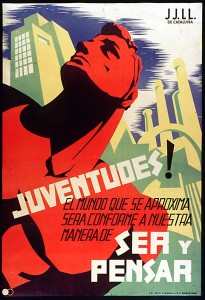¡Democracia Real Ya!
 Even for a Spanish news junkie like myself, it is hard to comprehend and convey the significance of the recent massive meetings of citizens in Spain’s symbolic center –the Puerta del Sol in Madrid– and in many other cities in Spain, and now, it seems, around the world. Here’s what I understand of the phenomenon.
Even for a Spanish news junkie like myself, it is hard to comprehend and convey the significance of the recent massive meetings of citizens in Spain’s symbolic center –the Puerta del Sol in Madrid– and in many other cities in Spain, and now, it seems, around the world. Here’s what I understand of the phenomenon.
This Sunday, May 22, there will be regional and municipal elections held throughout Spain; mayors of 8,000 cities and towns as well as the governors and parliaments of almost all of Spain’s regions (Comunidades Autónomas) will be elected. These elections are seen as a kind of dress rehearsal for the national elections that will take place in 2012. The polls predict that in both of these elections the PSOE –which has headed the national government for the last seven years– is going to take a real shellacking. The government’s handling of the economic crisis is probably the main factor contributing to this predicted outcome. The polls also suggest that voter participation is going to play a key role in the elections on Sunday; the conservative, opposition party –the Partido Popular– enjoys the almost unconditional loyalty of 80% of its registered constituents. The figure of constituent loyalty of the governing party –the Partido Socialista Obrero Español– is estimated to be at about 40%. It is thought that a considerable segment of regular PSOE voters will simply not turn out to vote, as a sign of their profound discontent with the government’s performance. For some, we are before another episode in Spanish history in which it looks like the discipline of the right will prevail over the divisions of a splintered left.
What no one –including the pollsters– seemed to imagine even just two weeks ago, was the sudden and spontaneous emergence, on the eve of these crucial elections, of a massive and growing citizens movement, unaligned with any party or trade union, in Madrid, Barcelona, Zaragoza and other major cities in Spain. The protesters are predominantly young –though they are being joined by a more and more diverse group of manifestantes— and what they are decrying is not the platform of this or that party, but rather, nothing less than what they see as the Spanish status quo: ie, a de facto two party system (Partido Popular and the Partido Socialista Obrero Español) whose leaders seem to respond more readily to international financial institutions and credit rating agencies, than to the voters who put them in office. One common banner at the protests of Madrid even fuses the logos and initials of the two major parties, suggesting that the PPSOE might as well be a single political formation. Another common sign at the rallies reads: “No party represents me.”
Now, Spanish law mandates a 24 hour “day of reflection” on the eve of elections. The law is supposed to outlaw unseemly last-minute appeals by candidates and parties, and to allow voters to deliberate in private. Public assemblies aimed at affecting the outcome of the election are forbidden during the day of reflection. In these days of twitter, text messages and facebook, this prohibition of public gatherings seems quaintly antiquated, like a vestige of nineteenth-century notions and practices of democratic politics. But the law is on the books, and late last night, Spain’s National Election Council declared that the Democracia Real Ya protesters–even though they are not promoting any party or candidate– will be breaking the law should they attempt to convene at the Puerta del Sol or elsewhere during the Day of Reflection.
Now here is where things get extremely complicated, maybe even twisted. The prohibition of the DRY assembly is, on its surface, an attempt to avoid last minute manouvering and electioneering that might unduly affect the results at the polls. But now that the National Election Council has outlawed the DRY assemblies, Spain’s national government –led by the PSOE, and Zapatero’s likely successor, the current Minister of the Interior, Alfredo Pérez Rubalcaba– is legally obliged to crack down on the protests scheduled for Saturday, an obligation that is SURE to affect the outcome of the elections one way or another.













I agree it is very exciting. The whole parliamentary system Spain has is particularly ill suited for the Spanish mind-set. There is very little chance this will ever change. The folks gathered in the Puerta del Sol can protest all they wish but it is doubtful it will bring about the painful changes necessary to make the country a more dynsmic and fair and more equitable democracy. The combination of corruption on the one hand and a society expecting subvenciones for everythinh is a nasty one.
Very well put, an excellent summary
[…] about the Spanish demonstrations https://albavolunteer.org/2011/05/%C2%A1democracia-real-ya/ […]
[…] about the Spanish demonstrations https://albavolunteer.org/2011/05/%C2%A1democracia-real-ya/ […]